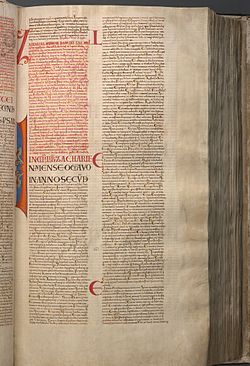Zechariah 4
| Zechariah 4 | |
|---|---|
 The beginning part of the Book of Zechariah (1:1-6:15) in Latin in Codex Gigas, made around 13th century. | |
| Book | Book of Zechariah |
| Category | Nevi'im |
| Christian Bible part | Old Testament |
| Order in the Christian part | 38 |
Zechariah 4 is the fourth of the 14 chapters in the Book of Zechariah in the Hebrew Bible or the Old Testament of the Christian Bible.[1][2][3] This book contains the prophecies attributed to the prophet Zechariah, and is a part of the Book of the Twelve Minor Prophets.[4] This chapter is a part of a section (so-called "First Zechariah") consisting of Zechariah 1–8.[5]
Text
The original text was written in the Hebrew language. This chapter is divided into 14 verses.
Textual witnesses
Some early manuscripts containing the text of this chapter in Hebrew are of the Masoretic Text, which includes the Codex Cairensis (from year 895), the Petersburg Codex of the Prophets (916), and Codex Leningradensis (1008).[6][7][a]
Fragments containing parts of this chapter were found among the Dead Sea Scrolls, that is, 4Q80 (4QXIIe; 75–50 BCE) with extant verses 1–4.[8][9][10][11]
There is also a translation into Koine Greek known as the Septuagint, made in the last few centuries BCE. Extant ancient manuscripts of the Septuagint version include Codex Vaticanus (B; B; 4th century), Codex Sinaiticus (S; BHK: S; 4th century), Codex Alexandrinus (A; A; 5th century) and Codex Marchalianus (Q; Q; 6th century).[12]
Vision of the lampstand and olive trees (4:1–6)
The fifth of the eight visions uses the 'seal imagery' of the golden lamp and the olive-tree to symbolize joint leaders to do the works for God: Joshua the high priest and the Davidic governor Zerubbabel.[13]
Verse 6
- So he answered and said to me:
- “This is the word of the Lord to Zerubbabel:
- ‘Not by might nor by power, but by My Spirit,’
- Says the Lord of hosts."[14]
- "Not by might": Zerubabbel's work will be accomplished through the grace of God alone. Septuagint: "not by great might", but the Haggai 1:1).[16]
- "But by my Spirit": the work is to be effected by the living Spirit (cf. Haggai 2:5) of God, unaffected by man's weakness, because God's might will bring strength out of weakness (Hosea 1:7; 2 Corinthians 12:10; Hebrews 11:34).[17] Also in the might of God's Spirit He appointed in the Church "first Apostles, then prophets and evangelists" 1 Corinthians 12:28, 'filling them with divine gifts and enriching them by the influx of His Spirit'.[18]
Oracle of response (4:7–14)
While the task to build the temple falls mainly on Zerubabbel, the two leaders are both 'anointed ones' (verse 14; lit. "sons of oil", from the same root as 'messiah').[13]
See also
- Lampstand
- Olive
- Zerubbabel
- Related
Notes
- ^ Aleppo Codex (930) at present only contains Zechariah 9:17b–14:21.[8]
References
Citations
- ^ Collins 2014, p. 421.
- ^ Hayes 2015, Chapter 23.
- Jewish Encyclopedia
- ^ Mason 1993, pp. 826–828.
- ^ Coogan 2007, p. 1357 Hebrew Bible.
- ^ Würthwein 1995, pp. 35–37.
- ^ Boda 2016, pp. 2–3.
- ^ a b Boda 2016, p. 3.
- ^ Dead sea scrolls – Zechariah
- ^ Ulrich 2010, pp. 620–621.
- ^ Fitzmyer 2008, p. 39.
- ^ Würthwein 1995, pp. 73–74.
- ^ a b Larkin 2007, p. 612.
- ^ Zechariah 4:6 NKJV
- ^ Exell & Spence-Jones 1890.
- ^ Gill 1763.
- ^ Jamieson, Fausset & Brown 1871.
- ^ Barnes 1998.
Sources
- Barnes, Albert (1998) [1884]. "Zechariah 4". In James Murphy (ed.). Notes on the Bible (Reprint ed.). London: Blackie & Son – via Grand Rapids: Baker Books.
- Boda, Mark J. (2016). Harrison, R. K.; Hubbard, Jr, Robert L. (eds.). The Book of Zechariah. New International Commentary on the Old Testament. Wm. B. Eerdmans Publishing. ISBN 978-0802823755.
- ISBN 9781451469233.
- ISBN 9780195288810.
- Exell, Joseph S.; Spence-Jones, Henry Donald Maurice, eds. (1890). "On "Zechariah 4". The Pulpit Commentary.
- ISBN 9780802862419.
- Gill, John (1763) [1746]. "Zechariah 4". Exposition of the Entire Bible.
- ISBN 978-0300188271.
- Jamieson, Robert; Fausset, Andrew Robert; Brown, David (1871). "Zechariah 4". Jamieson, Fausset, and Brown's Commentary On the Whole Bible.
- Larkin, Katrina J. A. (2007). "37. Zechariah". In ISBN 978-0199277186. Retrieved February 6, 2019.
- Mason, Rex (1993). "Zechariah, The Book of.". In ISBN 978-0195046458.
- Ulrich, Eugene, ed. (2010). The Biblical Qumran Scrolls: Transcriptions and Textual Variants. Brill.
- ISBN 0-8028-0788-7. Retrieved January 26, 2019.

